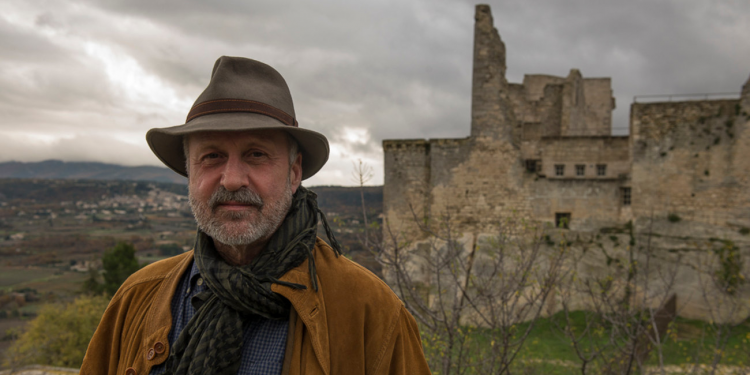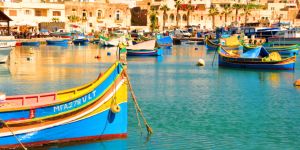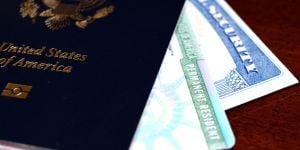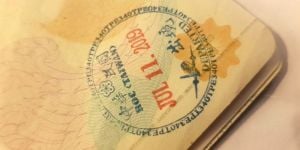
Tim comes from the USA where he used to be a development and finance specialist. In 2005, he moved to France with his partner Michael. He settled in Nice in 2013 after spending a few years in Paris.
Where are you from, Tim, and what are you doing nowadays?
When I was twelve years old, my elementary school had a spaghetti dinner fundraiser. I sat across from an “old” man (he must have been 35!) who told me that he had been to forty countries and spoke five languages. On the spot, I decided that was the life that I wanted. By the time I left high school, I also knew that I wanted to help the world's poor.
So that's what I did. I became an economic development and finance specialist on projects helping the very poor in the US and around the world. Eventually, I worked in at least half the States and over forty countries, some for over two years. My partner, Michael, was also in international development (on the staff of the Peace Corps), and we managed to coordinate our careers overseas – I should add, before gay couples were recognized, so it wasn't always easy.
In 1997, we were living in the Occupied Palestinian Territories when I realized that I definitely needed to reduce the stress in my life. That's when I quit working and took up full-time fiction writing. I spent a few years in Rehoboth Beach, Delaware, while Michael commuted to DC until he could retire. In 2003, we celebrated his retirement with a trip around the world in 100 days.
Even before that, we had made the decision to move to Europe. We had never worked there – only traveled – but knew we loved the lifestyle. So in 2005, we bought an apartment in Paris and moved there. Eight years later, we relocated to Nice.
From the USA to France, what has driven your choice?
I love to wake up to beauty and to be in a place where an effort has been made to make it beautiful and retain its charm. France is certainly all of that. I also wanted to get away from America's car-dependent culture, and knew it was possible in France. Here in Nice, we walk everywhere we need to go in town, or take a bus or tram. The same was true in Paris, except that we used the Metro instead of a tramway.
I would be remiss not to mention the café lifestyle. It is nothing more than being able to walk to the corner, sip an espresso, and people watch – and yet it is so enjoyable. That's what really drew me to France, because it summed up what France is all about: charm, and an appreciation for life – even though the French complain constantly. They have no idea how good they have it. Plus, I confess, I am a coffee addict.
As a US national, what where the procedures you had to follow to move there?
Actually, the procedures were pretty easy, and certainly clear. They often seem bureaucratic to Americans who have never experienced trying to move abroad or get a permanent visa, but just ask an immigrant to the US what it took to get a green card.
We moved to France as long ago as 2005, so the procedures might have changed. They were: get a long-term (6 months) visa from the French Embassy or Consulate in the US, then come to France, and within six months, apply for your Carte de Sejour. That's a residency card good for one year, and renewable every year for five years. After five years, if you have been filing French taxes, you can apply for a ten-year permit.
Since Americans file their taxes before French taxes are due, and there is a tax treaty between the two countries, expats who aren't working in France usually owe little or nothing in French taxes. Also, the French do not tax retirement income.

What attracted you to Paris at first, and then to Nice ?
Paris has so many things going for it. It's certainly one of the most beautiful cities in the world. When we lived there, every day I woke up glad to be in Paris. Even the grey winters didn't bother me. They were part of Paris, its romance and atmosphere.
Unfortunately, pollution forced us to leave. When we first moved to Paris, I noticed a lot of people coughing, and mentioned it to our wine dealer. He said it was pollution. I looked out at the blue sky and thought he was crazy. Eight years later, I was coughing all the time. Sadly, Paris has a real problem with microscopic diesel particles.
We chose Nice for two reasons: its clean sea air, and all the other great reasons to choose Nice. Culturally, there's plenty going on. All year round, there's opera, concerts, jazz and music festivals, and more. Nearby, Monaco brings in world-class modern dance. In the back country, which basically means an hour drive into the foothills of the Alps, there's skiing and whitewater rafting; and there are hiking trails all up and down the coast, and Italy is twenty minutes away by train.
I didn't realize how important living next to the sea would become for me. It's given me a chance to (largely) overcome a lifelong fear of swimming in open water. Now I do it every day that I can. Looking for sheltered beaches has been a good excuse for exploring the area.
What Nice lacks are the big art exhibits—things literally mounted on a grand scale or major retrospectives of important artists. That's what I miss most about Paris, and its sophistication. I do miss Paris, otherwise, I'm glad to be in Nice.
What has surprised you the most at your arrival?
I wasn't surprised by very much. Everything was pretty easy. I've had a lot of experience sorting out living in a foreign countries, and France was piece of cake.
Was it difficult to find accommodation there?
We bought an apartment, so that made things easy. Expats who rent have a harder time finding accommodation, though it is certainly possible. The French are risk-adverse, so landlords tend to rent only to people with an employment contract – which are good for life, or almost. (That's why there are demonstrations whenever the government tries to amend the standard employment contract.) So expat renters need to be prepared to put a sizable security deposit into a bank account or pay, for example, a year's rent in advance, but not always, especially if a property's owner is also a foreigner.
What are the local labor market's features? Is it easy for an expat to find a job there?
The economy in general has been depressed since 2009 and unemployment has stayed high. It hasn't changed much in terms of goods and services, but it is definitely not a place for a non-EU citizen to come and find a job. Following the Brexit vote, I suppose Brits will start finding it harder, too.
How do you find the French lifestyle?
I am amazed by the high quality of life in France. For the French, that means excellent medical care, daycare for children from the age of six months, free education, a guaranteed month-long vacation plus other holidays, and so on. A lot of that doesn't make much difference to an expat, but it does help define the nature of the place.

Have you been able to adapt yourself to the country and to its society?
Sure. We both took French and early on made an effort with the language, which paid off. We're conversant (not fluent), and can be at a party or dinner and speak French all evening. We have made a number of French friends, though admittedly most have an expat connection. The French tend to socialize with their family and friends from childhood, so in that sense, it is not an easy society to break into.
What does your every day life look like in Nice?
It changes between summer and the rest of the year. In the summer, I usually swim first thing in the morning, when winds are the lightest and the sea the calmest. In the winter, I am in a pool, so it doesn't matter when I swim.
I spend a lot of time at my desk, taking care of business, marketing, editing, etc. It's five minutes walk to Place Garibaldi for coffee or lunch, so I might go there. I try to always be at my desk by 5, when my creative gear kicks in and I work through the evening on new work.
What is your opinion on the cost of living in Nice? Is it easy for an expat to live there?
People are surprised when I say it's a lot cheaper to live on the French Riviera than in any desirable location in the States, including both ocean coasts, New England, New York, Florida, Chicago, Santa Fe – in fact, really much of the US. And London? The whole world is less expensive than London!
The food is cheaper and not genetically modified. Property taxes are half or less of what we were paying the States. My monthly transportation expenses amount to $20/month, and every four to six weeks we rent a car for three days, so add $100. Prescription drugs are 1/10th the price. (We have friends come over, fill three months' worth of prescriptions, and the savings covers their airfare).
Besides cost of living, it is also simply easy to live here. It's easy to get the information you need. Medical care is excellent. (By one account, France has the #1 health care system in the world compared to the US at #37.) You never have to feel insecure that, in an emergency, you won't be admitted to a hospital: you will be. No insurance card required.
Everywhere you go in the center of town is safe all night. Enough people speak English that you are always only one person away from being understood, max. Many signs are in English.
How do you spend your leisure time?
I'm not retired with a lot of time to fill. I pretty much manage my life around my writing, including when I take real vacations (when I really can't work) as opposed to working vacations. For twelve years, we've been going back to the same village on the same island in Greece, and my desk, chair and printer are waiting for me when I arrive. That's a working vacation.
That Greek island has also been the inspiration for my latest novel, Fire on the Island, which I am just starting to circulate hoping to find a new agent.

Your favorite local dishes?
Steak frites.
Roquefort cheese (the real thing).
Duck breast.
Every French version of mashed potatoes.
Wine – any color.
What do you like the most about France?
Its beauty, educated people and sophistication. A real sense of street safety (the recent terrorist attacks notwithstanding). No one has a gun: you can't be the victim of road rage. It's possible – indeed, preferable – to live without owning a car. And it's affordable despite being one of the most desirable places to live that I have ever been.
What do you miss the most about your home country?
Free refills on iced tea.
Would you like to give any advice to soon-to-be expatriates in France?
Make a real effort to learn French; and if you think you might stay a long time, start off doing absolutely everything legal.
What are your plans for the future?
More travel, and more writing. We will be back on our Greek island in June next. It's been the inspiration for my latest novel. Michael, who is a fine arts photographer, has documented our life in Nice and our various travels on his web page.



















